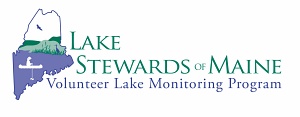News: In Hot Water Series by Peter McGuire August 2024
In August 2024, Maine Public aired a series of stories by Peter McGuire, “In Hot Water”, looking at the issues of climate change and lakes. Issues covered included LSM’s monitoring work, water temperature, loss of ice, aquatic invasive species, cyanobacteria, stormwater runoff, watersheds, the courtesy boat inspector program, the LakeSmart program, and interviewed us and many of our colleagues.
Listen or read the stories on ✅ Source: Maine Public
List of our colleagues, in order of appearance, referenced in the articles and what we each (briefly) do:
- Lake Stewards of Maine (LSM): A statewide 501(c)(3) nonprofit that trains and certifies volunteer community scientists to gather data for water quality monitoring and to survey lakes for aquatic invasive species. LSM offers technical support and assists lake communities with their stewardship efforts, including ice data tracking and watershed activities, which are crucial for understanding the health of lakes.
- Lakes of Maine: A comprehensive lake resource, serving as a data repository for information collected by certified volunteers and professionals across the state. Managed by LSM.
- Maine DEP – Lake Assessment Program: Regulatory agency that oversees issues of lake water quality health and performs annual baseline sampling of lakes throughout the state. Helps ensure data quality assurance with LSM.
- Maine DEP – Invasive Aquatic Species Program: Regulatory agency that oversees issues of invasive aquatic plants in Maine lakes focusing on prevention, management, and control of invasive aquatic species.
- Maine DEP – Nonpoint Source Water Pollution Grant Program: Regulatory agency that provides grants and guidance for watershed activities.
- Seven Lakes Alliance: Regional non-profit, conserves lands and waters of the Belgrade Lakes region for all in support of vibrant communities and economies. With public and private partners, they monitor, research and remediate water quality, prevent invasive species spread, and prevent and control erosion through the LakeSmart and the Youth Conservation Corps programs.
- University of Maine: A research university with focus areas including paleolimnology, geomorphology, geochemical cycling, climatology, forestry, economics, and ichthyology. Recently, published an economic assessment finding Maine lakes contribute over $14,000,000,000 annually to Maine’s economy.
- 30 Mile River Watershed Association: A public-private collaboration of towns, lake associations and land trusts in central Maine, 30 Mile works as a community to keep the 22 lakes, ponds and streams in the watershed clean and healthy. 30 Mile hosts a Youth Conservation Corps, is a regional hub for LakeSmart, monitors water quality, provides technical assistance for road associations and municipalities, and works to monitor and manage invasive aquatic plants.
- Lakes Environmental Association (LEA): A multi-lake association based in the upper Sebago Lake region, LEA works to protect water quality on 41 lakes and ponds in western Maine. LEA runs the statewide Courtesy Boat Inspection program, hosts the annual Milfoil Summit, and runs the Maine Lake Science Center. They offer technical services to lakefront landowners, municipalities and are a LakeSmart Hub.
- Youth Conservation Corps: US Dept. of Agriculture program which partners with local organizations to employ summer youth workers. Generally, focused on conservation activities of a physical nature such as park or trail stabilization or improvements, watershed improvement activities, habitat preservation, or historic site preservation.
- Maine Climate Council: State of Maine initiative to develop a four-year plan to address the impacts of climate change on Maine, build resiliency to climate effects, and meet state statutory targets to reduce greenhouse gas emissions.
- Maine Lakes: A statewide nonprofit that works to keep Maine’s lakes healthy by managing the LakeSmart program, supporting local lake associations, promoting freshwater education initiatives, advocating for sound lake policies, and providing resources and a “lake library” for lake residents and visitors.
